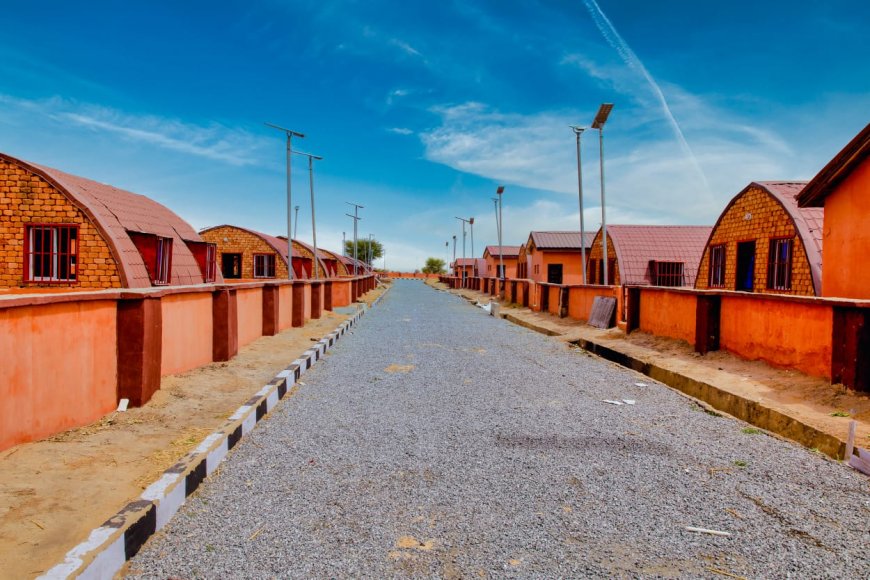Boosting Coconut Production In Imo State

By Nnamdi Cos-Ukwuoma
Coconut can be described as a fat fruit that is highly nutritious and has been associated with a wide range of health benefits and economy boosting potentials. Originating from India and Southeast Asia, with the scientific name Cocos nucifera, grow in warm climates across the globe, especially in the Carribeans and parts of Africa and South America. In Nigeria, coconut does well in about 30 out of the 36 states, including Imo.
Coconut is high in fiber and low in carbs. Coconut meat and water contain numerous antioxidants that fight against factors causing cell damage. The health benefits inherent in coconuts are immense. Coconut provides nutritious fats and other micronutrients deeply beneficial to health and help to detoxify the body. It enhances cardiac health, fertility, libido as well as maintain healthy digestive system and essential body organs. Research and evidential proofs of the effectiveness of coconut in the prevention and management of chronic diseases exist.
The antioxidant properties of coconut reduce the risk of, and manages many chronic diseases such as cancer, diabetes, alzheimer's syndrome, hypertension, arthritis, Parkinson's syndrome as well as boosts the immune system, prevents infertility in men and women and prevents and eliminates digestive problems.
As any other source of healthy fats, desicated coconut lowers unhealthy levels of LDL cholesterol while increasing the level of HDL cholesterol. It is both antibacterial and antifungal. The fat content in coconut nourishes the skin, keeping it hydrated and supple. Regularly rubbing coconut oil on the lips gives natural pink lips.
Coconuts can be eaten fresh as well as dried. It can be processed into coconut oil, coconut cream, coconut milk, coconut flour, flakes and dried coconut. Coconut water has amazing health benefits, as it helps detoxify the body by providing hydration and antioxidants. Certain varieties of coconut water are packed with vitamin C and antioxidant properties.
Aside from health benefits, the economic importance of coconuts has contributed to the growth of the global economy. There is no other agricultural commodity in the world that has developed such a strong and effective public-private partnership as the coconut. It is a very important cash crop that can generate for Nigeria billions of naira and hard currency.
Return On Investment Of Coconut
As a matter of fact, coconut is the latest area to invest. Establishing coconut plantation on a hectare of land requires about 200 seedlings, using 7m × 7m spacing. 200 seedlings will develop to yield minimum of 100-200 fruits per tree from the 3rd year of fruiting. It can therefore be roughly but safely estimated that one hectare of land yields between N6M - N10M worth of coconut fruits, selling at between N150 to N250 per coconut fruit.
Coconut Oil
About 10 coconut fruits produce 1 litre of oil. A hectare of well maintained coconut plantation can produce coconuts that can be converted to 4000 litres of oil. A litre of coconut oil sells at N7,500 to N8,000. That gives nothing less than N30M per hectare of harvest. Cold pressed coconut oil costs much more and is in high demand. I litre of cold pressed coconut oil costs about N12,000
There are over 300 byproducts of coconut. These are used in pharmaceutical, cosmetic and other prime industries. The flesh, after extracting the oil is converted to coconut flour. Coconut water is packaged as energy drink. The shells are converted to coco peat and ornamental crafts, while coconut husk is converted to textiles, briquettes ( Charcoal), craft material. It is also for making rope, etc.
The sticks are used for making brooms and ropes, the leaves are used for thatching, baskets, hats, etc. The wood is used for making furniture, carvings, cabinets, flooring and for construction.
The greatest advantage of coconut farming is that it is less time consuming and less demanding than other tree crops. Though it requires patience and maintenance for a minimum of three and half years.
Comparatively, it does not take up to 10% of the attention and maintenance, including nutrients demand that other palms demand. It allows intercropping with legumes as its demand for nutrients is far less than that of other palms. The coconut tree prunes itself as it develops, unlike the oil palm tree.
Harping on the economic potentials of the coconut, the President of the National Coconut Producers, Processors and Marketers Association of Nigeria (NACOPPMAN), Dr Mrs Nma Okechukwu-Okoroji, in her opening remark at the 2020 World Coconut Day celebration held in Abuja, revealed that coconuts can help generate over $400 billion for the Nigerian economy annually.
She said, "Our economy of production has proven that the coconut sub-sector can contribute over 400 billion USD to the Nigerian economy annually. How much is the cost of crude as compared to that of coconut? It is three times higher, and the demand for coconut products is increasing every day."
"Between 265 tons of coconut are produced in Nigeria presently, and 70 percent of it is produced by Lagos State, and 30 percent is produced by the other states in Nigeria," she stated.
Despite the enormous economic potential of coconuts, it has been difficult for successive governments in the country to explore their far-reaching economic importance. This has hindered the possibility of ensuring that the coconut subsector in the country makes a massive contribution to the nation's GDP.
However, unfazed and undaunted by this setback, the National Coconut Producers, Processors, and Marketers Association of Nigeria (NACOPPMAN) has taken a series of steps and measures to ensure that the economic importance and health benefits of coconut do not elude the Nigerian populace.
Thus, it became imperative that the organisation must go beyond the ordinary to key into the global vision of massive coconut production for health and for wealth. The key focus is to attract more coconutpreneurs/investors in the production, processing, commercialization and utilisation of the coconut. The crop can really play a significant role in the economic development of the individuals, organisations and states of our dear country, Nigeria.
The coconut is a tree of life, a cash crop that grows in over 30 of Nigeria’s 36 states, with Lagos State having the largest production area. An estimated 36,000 hectares is presently under cultivation mostly in Lagos, Akwa Ibom and Rivers state. An estimated 1.2 million hectare of land is suitable for coconut cultivation (NIFOR, 2008).
The largest producers in the world are Indonesia and Philippines while Tanzania ranks the highest in Africa. Nigeria is ranked 18th position in the world. That is the critical point why the 2023 Coconut Planting Season Flag-Off is aimed at achieving the Actualization of Coconut Sufficiency in Nigeria by 2027 (COSIN) through the establishment of coconut tree planting, the establishment of 10,000 square meters of coconut farms in all Coconut Viable States and 1 Family 3 Coconut Trees and 1 organisation 10 Coconut Trees Initiative.
Apart from setting aside a day for the flag-off of coconut planting season, a day is also set aside to celebrate World Coconut Day. As Nigeria marks 2023 World Coconut Day on September 21, 2023 with the theme: Sustaining The Coconut Sector For The Present And Future Generation Through COSIN, it is my hope and expectation that critical stakeholders in the sector will wake up to glaring realities of our time, that investment in agriculture is the only shortcut and sure way to reducing unemployment and boosting the economy.
It is also my expectation that Imo State will not be left out in the current trend of massive investment in the coconut sector. In my humble opinion, farmers have fared well, despite peculiar challenges, including unavailability of land, non availability of credit facilities, neglect of the agriculture sector, low morale and incentives and much more.
The National Coconut Producers, Processors, and Marketers Association of Nigeria (NACOPPMAN), Imo State Chapter has initiated several steps and taken key initiatives to step up investment in the coconut sector in the state. There is a comprehensive plan/roadmap to increase productivity of coconut farmers and growers, to ensure sustainable livelihoods for them across the state. Through this strategy, there will be doubled yields through improved planting protocols, fertilizer applications, and routine agricultural practices.
In addition to this, proactive steps are being taken to promote alternative income-generating activities for coconut farmers, ensuring an effective agricultural cooperative framework that benefits them and a more inclusive methodology to empower women farmers and the youth. As such, imperative is a coconut cluster that will properly and profitably harness the value chain for the benefit of all players in the industry in the state.
Aside from the state government, the private sector, especially financial institutions, has a huge role to play in boosting and increasing coconut production in the state. Given the trend in the coconut subsector all over the world it is important to form strong public-private partnership or alliance to establish a coconut cluster in the state, as proposed by the organisation's chapter in the state during 2023 Coconut Tree Planting Season Flag off held at Owerri Catholic Archdiocesan Headquarters, Assumpta Cathedral Owerri.
NACCOPMAN, Imo State, has shown a relentless commitment to work with governments at all levels, development partners and environmental groups to help tackle some environmental factors, such as erosion and climate change that negatively impact on the environment and standard of living and hinder farming practices, especially coconut production.
Also, steps have been taken by the association to encourage every household to plant at least 3-5 coconut trees, while institutions are implored to plant 10 - 100 coconut trees, depending on the size of their premises and capacity.
It is also imperative that the industry, government, and civil society work closely, as such partnership would lead to improved growth in the subsector. In line with such an understanding, it will be expedient that the Imo State government set in motion the process of establishing a Coconut Development Commission or Agency, in line with the trend in other states in Nigeria.
Such noble initiative would boost production of coconut and its value chain as well as boost the local economy, reinvigorate and diversify the income base of the state.
Cos-Ukwuoma Nnamdi, a farmer, agro-dealer and media strategist, is the Imo State Chapter Chairman of the National Coconut Producers Processors and Marketers Association of Nigeria (NACOPPMAN). He wrote in from Owerri.
What's Your Reaction?





























































